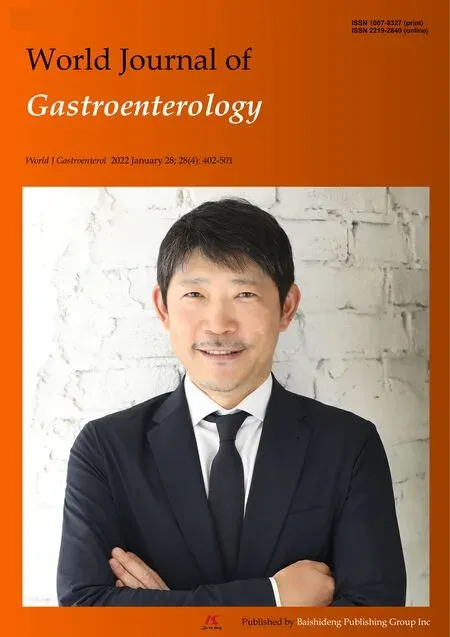ls CA19-9 effective in predicting chemotherapeutic response in patients with synchronous liver metastases with colorectal cancer?
Semra Demirli Atici,Erdinc Kamer
Abstract Evaluation of response to chemotherapy in colorectal cancer patients with synchronous liver metastases is important in terms of treatment management.In this Letter to the Editor,several issues in the article are discussed.For the comparison of carbohydrate antigen 19-9 (CA19-9) values referenced in the study,the patient group was not matched for cancer stage.Therefore,it may be more appropriate to select and compare CA19-9 values in patients with same-stage cancer.
Key Words:Colorectal cancer;Carbohydrate antigen 19-9;Liver metastasis of colorectal cancer;Synchronous liver metastasis;Chemotherapy;Metastatic colorectal cancer
TO THE EDlTOR
Maet al[1] recently published a retrospective study on the emerging role of a magnetic resonance imaging (MRI)-radiomics signature to detect the predictive efficiency of models for chemotherapeutic response in colorectal cancer (CRC) patients with synchronous liver metastasis (SLM) and avoid ineffective chemotherapy.
Carbohydrate antigen 19-9 (CA19-9) has been routinely studied in patients with CRC,and in the study by Maet al[1] the measurement of CA19-9 was found to be significant between the disease non-response (non-DR) and disease response (DR) to chemotherapy groups (P=0.045).The authors showed that CA19-9 Levels were higher in the DR (63.3%) group than in the non-DR group (43.4%).The authors reported that CA19-9 is a promising indicator for predicting response to chemotherapy,citing the study by Zhouet al[2].However,the study design used by Zhouet al[2] had included patients with stage III CRC,while the study by Maet al[1] focused on patients with stage IV CRC.
Although it is known that high CA19-9 Levels are a poor-prognosis factor in untreated stage IV CRC patients,routine measurement of CA19-9 in colon cancers is not recommended by the American Society of Clinical Oncology (ASCO) guidelines due to insufficient evidence[3,4].As such,we believe that it would be more appropriate to discuss the results of the study by Maet al[1] in the context of other studies conducted with stage IV CRC patients[4,5].
 World Journal of Gastroenterology2022年4期
World Journal of Gastroenterology2022年4期
- World Journal of Gastroenterology的其它文章
- lnterplay between chronic hepatitis B and atherosclerosis:lnnovative perspectives and theories
- Fibrinogen-like protein 2 deficiency inhibits virus-induced fulminant hepatitis through abrogating inflammatory macrophage activation
- Knockdown of DEAD-box 51 inhibits tumor growth of esophageal squamous cell carcinoma via the Pl3K/AKT pathway
- Celiac disease:From genetics to epigenetics
- Sarcopenia in hepatocellular carcinoma:Current knowledge and future directions
- Gut bless you:The microbiota-gut-brain axis in irritable bowel syndrome
